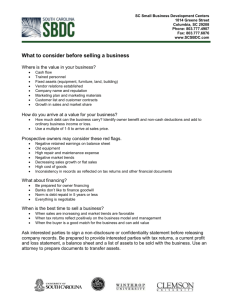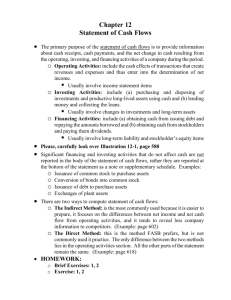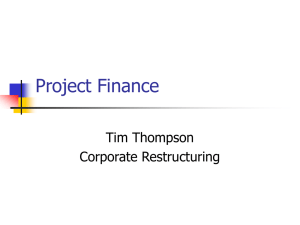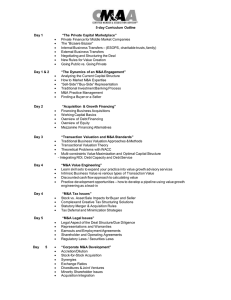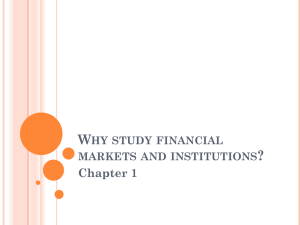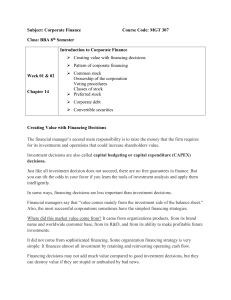Chapter 13 • An Overview of Corporate Financing
advertisement
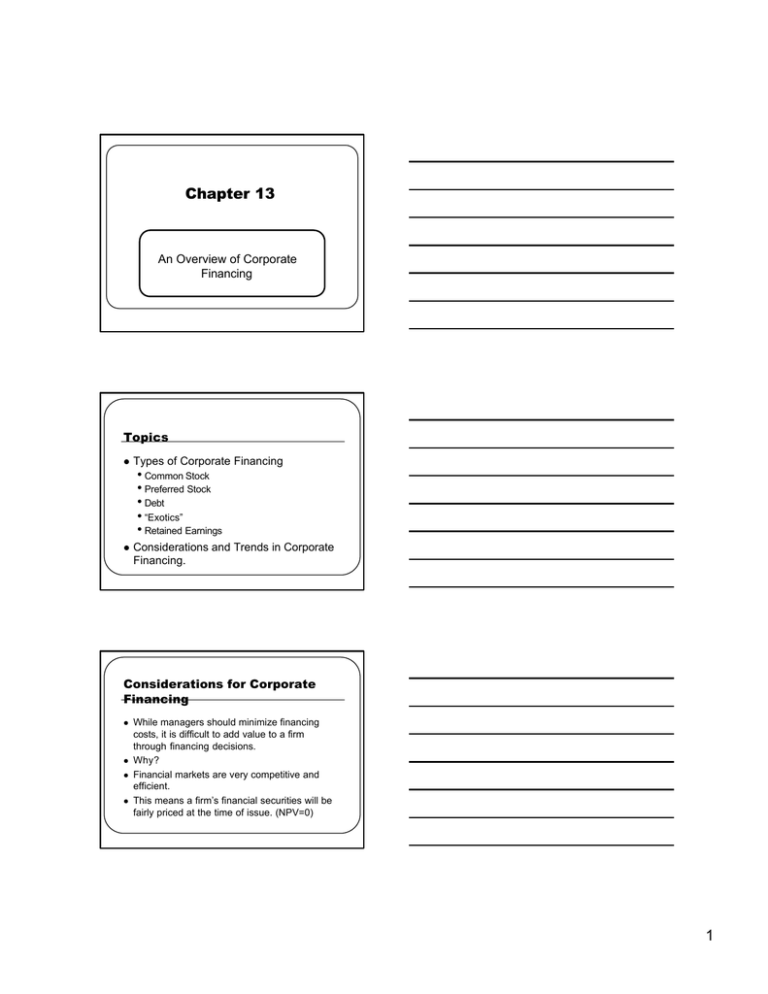
Chapter 13 An Overview of Corporate Financing Topics l Types of Corporate Financing • Common Stock • Preferred Stock • Debt • “Exotics” • Retained Earnings l Considerations and Trends in Corporate Financing. Considerations for Corporate Financing l l l l While managers should minimize financing costs, it is difficult to add value to a firm through financing decisions. Why? Financial markets are very competitive and efficient. This means a firm’s financial securities will be fairly priced at the time of issue. (NPV=0) 1 Facts about Common Stock: l l l l l Claim on Income after interest and dividend payments to creditors and preferred stockholders. Represents ownership. Ownership implies control. Limited liability. Stockholders elect directors. = Voting Rights • Majority vs. Cumulative voting. l Directors elect management. l Management’s goal: Maximize stock price. Advantages & Disadvantages of Financing with Common Stock: Advantages: l No required fixed payments. l No maturity. Disadvantages: l Controlling shareholders may lose some ownership control. • Preemptive Right l Future earnings shared with new stockholders. Possible EPS Dilution. l Higher flotation costs vs. debt. Common Stock Terms Treasury Stock Stock that has been repurchased by the company and held in its treasury Issued Shares Shares that have been issued by the company. Outstanding Shares Shares that have been issued by the company and held by investors. 2 Common Stock Book Value vs. Market Value Book value is a backward looking measure. It tells us how much capital the firm has raised from shareholders in the past. Book value = par value of common stock, additional paid-in capital, and retained earnings less treasury stock. It does not measure the value that shareholders place on those shares today. The market value of the firm is forward looking, it depends on the future dividends that shareholders expect to receive. Preferred Stock Characteristics l l l l l Unlike common stock, no ownership interest Second to debt holders on claim on company’s assets in the event of bankruptcy. Annual dividend yield as a percentage of par value Preferred dividends must be paid before common dividends If cumulative preferred, all missed past dividends must be paid before common dividends can be paid. Corporate Debt l Repayment Provisions • Sinking Fund • Callable Bonds l Seniority l Security • Unsubordinated vs. Subordinated debt • Collateral: assets pledged to back debt • Mortgage Bonds 3 Corporate Debt l Default Risk • Investment Grade Bonds: rated AAA to BBB • Junk bonds: speculative or below-investment grade bonds; rated BB and below. High-yield bonds. Corporate Debt l l l l l Eurodollars - Dollars held on deposit in a bank outside the United States. Eurobond - Bond that is marketed internationally. Private Placement - Sale of securities to a limited number of investors without a public offering. Protective Covenants - Restriction on a firm to protect bondholders. Lease - Long-term rental agreement. Convertible Securities Warrant - Right to buy shares from a company at a stipulated price before a set date. When packaged with a regular bond will reduce the cost of financing to the firm. Convertible Bond - Bond that the holder may exchange for a specified amount of another security. When exchanged debt financing turns into equity financing. Convertibles are a combined security, consisting of both a bond and a call option. 4 Patterns of Corporate Financing l l Firms may raise funds from external sources or plow back profits rather than distribute them to shareholders. Should a firm elect external financing, they may choose between debt or equity sources. 5
